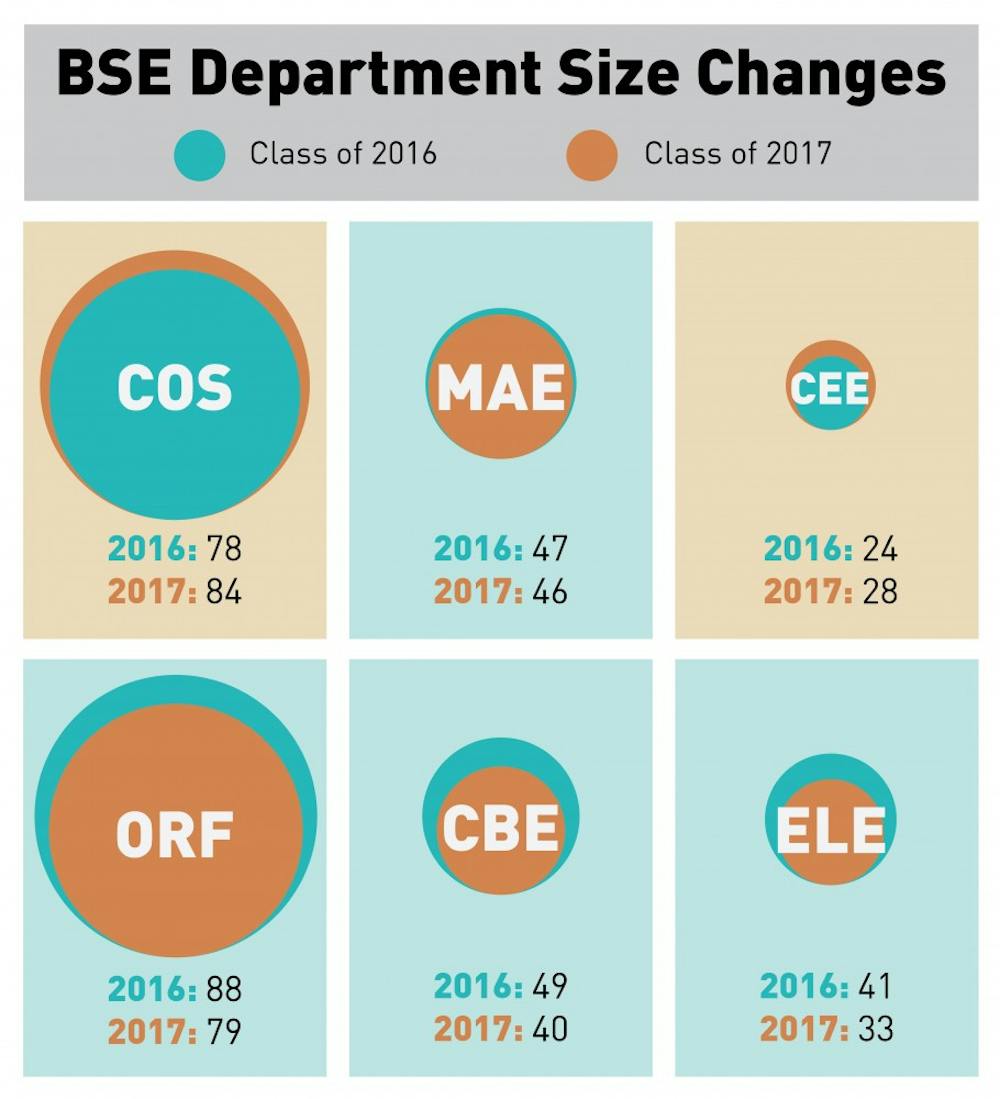While B.S.E. departments did not have significant changes in the numbers of freshmen who declared this year, computer science and Operations Research and Financial Engineering were the two most popular major choices for Class of 2017 B.S.E. students.
Official numbers will be released on Monday morning. The numbers reported for this article were obtained using College Facebook.
Computer science, with 84 concentrators, had six more concentrators than last year and was the engineering department with the largest enrollment this year.
Department chair Andrew Appel noted that the computer science department has grown consistently over the past 10 years, attributing its increase to the growing importance of computer science in modern society.
“Whether they go out find a job in business world … or whether they go into some scientific or scholarly field, computer science has great applications in many of those fields,” Appel said. “Another reason, I think, is that our introductory courses are taught very well, there are interesting and challenging materials, we have a lot of support for the students.”
Evelyn Ding ’17 said that she chose to concentrate in computer science because of the department’s strong support system and the fact that the skills can be applied to many fields.
The department with the second-highest enrollment, ORFE, saw a slight decrease in enrollment. The department had 79 concentrators this year compared to last year’s 88.

Department chair Jianqing Fan cited a few possible reasons why concentration in his department went down, noting that the Class of 2016 is larger than the Class of 2017 and that the increase in COS enrollment may have translated to a decrease in ORFE concentrators. However, he noted that although the enrollment for this year had slightly decreased, the department has grown consistently over the last 4 years, doubling in number of concentrators. The Class of 2013 had 41 students who declared ORFE.
“I think this must have something to do with nowadays so-called data-rich environment,” he said. “We have really become consumers of data, and I think that’s probably the main reason that the department increased [in its enrollment].”
Fan added that he thinks the department has reached a very stable stage with around 80 concentrators this year and last year, and this is probably the largest that the department can get, given that more than 60 percent of University students choose to major in humanities or social science departments.
The number of concentrators in the electrical engineering department decreased from 41 last year to 33 this year. Undergraduate departmental representative Andrew Houck noted that last year's number of electrical engineering concentrators was abnormally large and that the department normally has between 30 and 40 concentrators. Like Fan, he said the number of concentrators in his department has increased significantly in recent years, noting that the graduating senior class only has nine electrical engineering majors.

Houck attributed the growth of the department to its effort to make electrical engineering courses more hands-on.
“We are trying very hard to make students get in labs to do real design and learn fundamentals from design context from their sophomore years. We revamped all of our required courses," Houck said. "There’s project-based learning in every class."
Hope Lorah ’17, an electrical engineering major, said the department’s focus on project-based learning is definitely one of the main factors that attracted her to the concentration.
“When I went to the engineering open houses, the electrical engineering open house was, ‘Here’s the car you get to make in this lab, here’s the solar cell you get to make, and here’s the switchboard you get to make in this class,’" she said. "And it was very exciting."
The mechanical and aerospace engineering department increased to 46 concentrators, down from 47 last year. Acting departmental chair N. Jeremy Kasdin declined to comment.
Nikita Turley ’17 said that he liked the close ties between the mechanical and aerospace engineering department and the astrophysics department.
“I am actually the most interested in exploratory space vehicle design, and there are close ties between the MAE department and the astrophysics department, which is the best in the country,” he said. “So that will provide me with the opportunity to apply my knowledge in projects that I will be very interested in."
The Department of Chemical and Biological Engineering saw a slight decrease in enrollment as 40 students declared compared to 49 last year. Chemical and biological engineering department chair Richard Register declined to comment.
“Pretty cool major, very relevant to life. Difficult? Yes, but doable, especially with good group of study friends,”said CBE major Steven Tsai ’17.
The civil and environmental engineering department had 28 students declare compared to 24 last year. Civil and environmental engineering department chair James Smith did not respond to multiple requests for comment.
Staff writer Sarah Kim contributed reporting.








